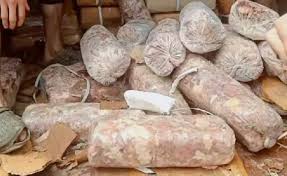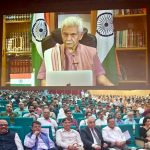Srinagar, Aug 19: Kashmir’s renowned culinary scene is undergoing a dramatic shift following a recent scandal involving rotten meat, which has led to a decline in demand for traditional non-vegetarian dishes like wazwan. Hoteliers and restaurateurs across the region are increasingly replacing meat-based menus with vegetarian options, as public trust in meat safety remains shaken and tourism faces new challenges.Earlier this month, authorities seized large quantities of spoiled meat during surprise inspections in Srinagar and adjoining districts. The revelation sparked public outrage, forcing many locals and tourists alike to avoid meat-based dishes. Since then, hoteliers have been struggling to keep their businesses afloat.Hilal Ahmad, a hotelier in Srinagar’s Rajbagh area, said, “Wazwan is the pride of Kashmiri hospitality, but after the rotten meat incident, people became reluctant to order meat dishes. We had to quickly introduce vegetarian alternatives to retain customers and protect our staff’s livelihoods.”From vegetarian thalis to South Indian dosas, continental veg platters, and even authentic Kashmiri vegetarian dishes like haak, nadru yakhni, and rajma chawal, the menus are undergoing a significant makeover.Shabir Khan, who runs a hotel in Gulmarg, said: “Surprisingly, the response has been good. Tourists, especially from outside the valley, are enjoying the variety. It has also opened a new business opportunity that we never thought about before.”Even in tourist hubs like Pahalgam, where meat-based cuisines dominate, the shift is visible. Rafiqa Bano, manager of a family-run guest house, said, “Earlier, we barely served veg dishes. But now, we’ve curated vegetarian menus, and it is working well. Guests appreciate the effort.”Tour operators say the food scare has had a direct impact on bookings. Mohammad Yousuf, a tour operator in Srinagar, said: “Tourists would come asking for wazwan by default. But after the rotten meat issue, many now ask specifically for vegetarian food options. Hotels that adapted quickly are doing better.”Locals, too, have adjusted their eating habits. Farooq Ahmad, a resident of Downtown Srinagar, said: “For weeks, my family stopped buying meat because we lost trust. We turned to vegetarian meals, and honestly, it has been refreshing. But the damage to meat sellers’ reputation is huge.”Even younger hoteliers see opportunity in the crisis. Arif Hussain, who recently opened a fast-food restaurant in Sonamarg, shared, “We have introduced fusion vegetarian dishes like mushroom kebabs and paneer tikka platters. It’s drawing young crowds, especially those who are health-conscious.” While stakeholders acknowledge that meat will always remain central to Kashmiri cuisine, many believe the episode has highlighted the need to diversify food offerings to meet changing tastes and regain public trust.
Search
Archives
- September 2025
- August 2025
- July 2025
- June 2025
- May 2025
- April 2025
- March 2025
- February 2025
- January 2025
- December 2024
- November 2024
- October 2024
- September 2024
- August 2024
- July 2024
- June 2024
- May 2024
- April 2024
- March 2024
- February 2024
- January 2024
- December 2023
- November 2023
- October 2023
- September 2023
- August 2023
- July 2023
- June 2023
- May 2023
- April 2023
- March 2023
- February 2023
- January 2023
- December 2022
- November 2022
- October 2022
- September 2022
- August 2022
- July 2022
- June 2022
- May 2022
© 2022 Foxiz News Network. Ruby Design Company. All Rights Reserved.








